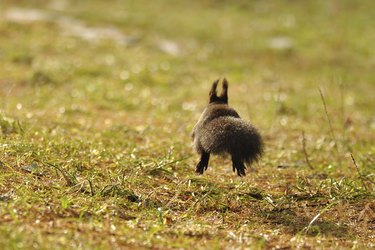
Squirrels root up bulbs and seedlings, chase birds from feeders, and they may ruin a garden bed with their constant shallow digging. A high-frequency squirrel repellent sound device seems like a cure that will drive away the pests with little effort and no chemicals, using nothing more than a squirrel repellent noise. Understanding how, and if, these devices work and the best methods for squirrel management is a better choice when protecting your garden from raiding pests.
Squirrel Ultrasound Device Claims
Video of the Day
Squirrel repellent sound devices purportedly use high-frequency, or ultrasonic, noise that disturbs rodents, such a squirrels, but is undetectable by humans and other animals. Plugging in the devices outdoors is supposed to drive the pests from your yard, protecting your garden beds and trees from further damage. The devices come in several forms, from those that plug into an electrical outlet to emitters atop stakes you can install in a garden bed. Some need to be near an electrical outlet and some are battery-operated.
Video of the Day
Squirrel Repellent Sound Reality
High-frequency sounds have minimal effect on squirrels. University of Nebraska–Lincoln Extension Lancaster County advises that the products are ineffective at repelling rodents, while the University of California Statewide Integrated Pest Management Program notes that squirrels quickly become used to sound repellents noises. Sound repellents may work well for short-term garden use, such as keeping squirrels out of a newly planted bed until the seedlings establish enough to resist damage, but they likely won't provide a long-term solution.
Keep Them Out
Exclusion methods provide one of the better ways to protect plants from squirrel damage. If squirrels are digging up the beds, lay a sheet of 1/4-inch mesh hardware cloth over the soil to prevent digging. You can also cover vegetable plants with mesh cages or floating row covers to keep the squirrels from plundering your harvest. Blocking openings into sheds and the home with 1/4-inch mesh will keep the squirrels out of attics and other indoor areas.
Combining an exclusion method with temporary use of a sound repellent may be more effective because the sound may prevent the squirrel from trying to find a way beneath the barrier, and instead send it scampering off to find easier feeding grounds.
Remove Feeding Opportunities
Although it's unlikely you can completely eradicate squirrels from your yard, you can make it less attractive without depending on a questionable high-frequency sound repellent. Bird feeders near garden beds will draw the pests to the area, so place the feeders away from problem areas, use squirrel baffles to keep the rodents away from the seed, or remove the feeders entirely.
There are highly effective bird feeders that toss the squirrels off the device – they're entertaining, but costly. Other less expensive but equally as effective feeders simply slam the feeding port shut when the weight of a squirrel is sensed by the feeder, denying the beastie an easy meal.
If You Can't Beat Them...
Many folks who don't want to give up their bird feeders experience a high level of success with the "If you can't beat them, join them" approach. Set out a ground tray of food that the squirrels can easily access. Corn is a squirrel favorite – whole kernel corn is as pricey as bird seed, but cracked corn is very cheap, and since it's a squirrel favorite and very cheap.